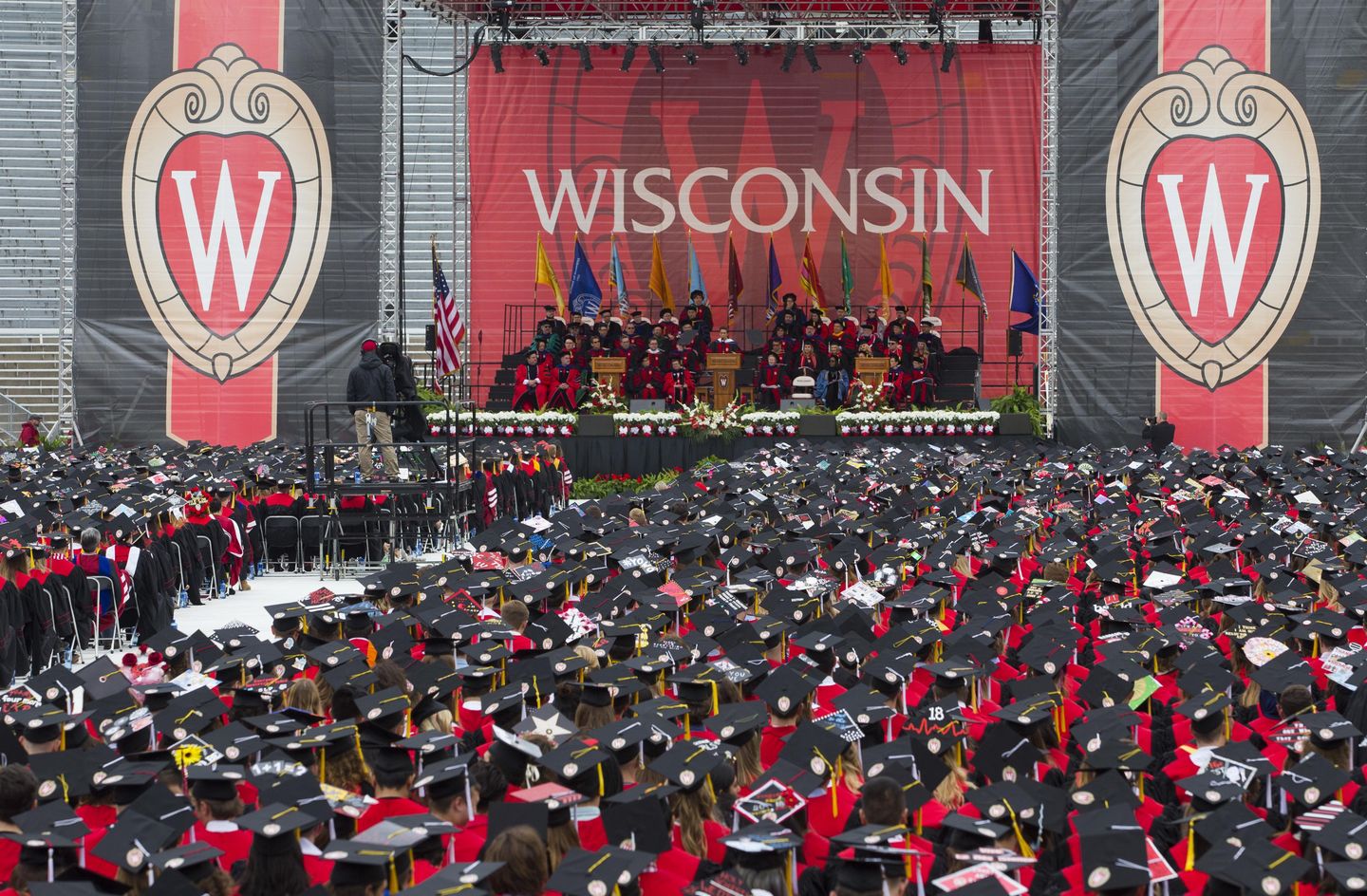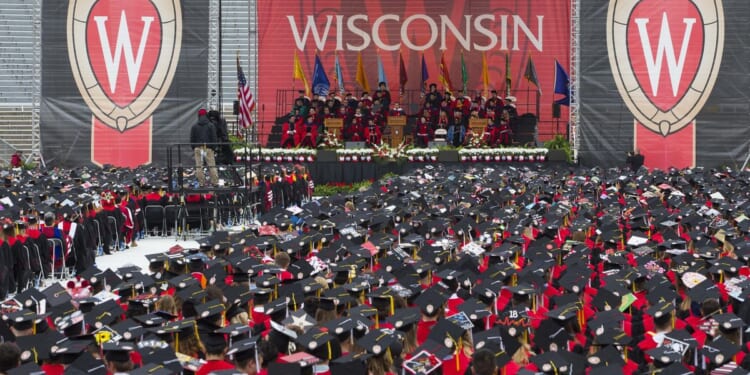
Americans have long viewed a four-year college degree as essential to financial success, but a report finds most graduates can’t find a job requiring one within a year of commencement.
The nonprofit Strada Institute for the Future of Work and the Burning Glass Institute reported Thursday that 52% of bachelor’s degree graduates had “underemployed” jobs in food service, hospitality, retail sales, office administration and other fields a year after earning a sheepskin. Their report analyzed federal statistics, job postings and online résumés for more than 60 million U.S. workers.
Ten years after graduation, 45% still didn’t hold a job requiring a four-year degree. By contrast, the report noted that 79% of graduates who started with college-level work still had it five years later.
While liberal arts and humanities majors struggled the most, the report found biology, physics, psychology and communications majors also failed to secure related positions.
The Indianapolis-based Strada Education Foundation said the findings “show that a college degree is not always a guarantee of labor market success.”
Several economists, workforce analysts and higher education leaders interviewed by The Washington Times agreed. They said the numbers underline a growing disconnect between what colleges teach and what employers need in a tight labor market.
“We should have stopped saying ‘STEM’ years ago [because] it inappropriately conflates quite different fields,” said R. Scott Crichlow, a political scientist and faculty senator at West Virginia University, which recently gutted its humanities programs. “While a college degree will substantially increase your income, some fields are wiser choices than others.”
Companies have eliminated college requirements for many technology, service and office jobs as they compete for a shrinking pool of workers.
According to the latest federal data, there are nearly 3 million more jobs than unemployed adults nationwide, making it harder to find workers for positions that traditionally required four-year degrees.
“Fortunately, with a tight labor market, employers are starting to recognize that thousands of well-qualified applicants are being screened out of their processes due to these unnecessary standards,” said Natalie Dopp, chief people officer at HireVue, a technology hiring firm based in Utah.
In an annual survey of more than 4,000 software, finance, retail and other hiring managers that HireVue published last March, 16% said they had dropped all college requirements. Another 48% reported adopting a “skills-first” approach to hiring.
Another survey of 800 companies that Intelligent.com released in November found that 45% intended to eliminate four-year degree requirements for some positions this year.
Also in November, PublicSquare and Idaho-based workforce recruiter RedBalloon reported that 67% of 905 small business owners they surveyed said four-year college graduates lacked “relevant skills that today’s business community needs.”
“A lot of students are wasting tens of thousands of dollars and years of their lives on meaningless college degrees,” Andrew Crapuchettes, RedBalloon’s CEO, said this week.
According to the Strada Institute report, recent graduates with college-level jobs earned average salaries of $60,000 a year. By comparison, the average high school graduate earned $32,000 a year, the average college dropout $35,000 a year and the average “underemployed” four-year college graduate $40,000 a year.
The Department of Education’s Federal Student Aid reported that the average college graduate owed $37,088 in federal student loans at the end of 2023, more than double the $18,233 the average graduate owed in 2007.
The Strada/Burning Glass report found many recent graduates took lower-paying jobs as fast-food workers, telemarketers, tour guides and office administrators. Others drew higher wages as managers in those industries without needing their four-year degrees to get hired.
“The temptation is to think of a typical ‘underemployed’ graduate as a humanities major working at a coffee shop,” said Stephen C. Miller, an economist at Troy University, a public campus in Alabama. “However, what seems more typical is someone with, say, a communications or general business degree working in sales or hospitality.”
The report noted that Black graduates, public college alumni and those who attended campuses serving low-income families struggled more than others to find college-level work. For example, 60% of Black graduates were underemployed a year later, compared to 47% of Asians, 53% of White graduates and 57% of Hispanics.
Bequita Pegram, a professor teaching social justice at Prairie View A&M University, a historically Black public campus in Texas, said the report challenges colleges like hers to “leverage their social capital to combat the barrier of underfunding.”
Minorities often struggle to find work after graduation due to “systemic barriers,” added Eugene Dilan, a California-based business consultant specializing in equity, inclusion and diversity. He said it gets harder for graduates to find college-level work after they start racking up menial jobs on their resumes.
“The first job post-graduation is crucial for long-term employment in degree-relevant fields, emphasizing the importance of early career support, particularly for underrepresented students,” Mr. Dilan said.
On the positive side, the report found computer science, health care, finance, accounting, data analytics and engineering graduates were more likely to find positions in their fields than other science, technology, engineering and math majors.
For example, 74% of engineering graduates held college-level jobs five years after graduating, compared with 53% of biology majors.
Additionally, the report found that the risk of not finding college-level employment dropped by 49% for graduates who participated in an internship during school. It urged colleges to find more paid internships and ways to reduce student costs.
Reached for comment, some higher education groups defended the value of a four-year degree.
“Underemployment of college graduates is not a reflection of the value of college, and this report reaffirms the value of a college degree,” said Charles L. Welch, president and CEO of the American Association of State Colleges and Universities, a network of public campuses.
He pointed to research from the College Board showing that four-year graduates are more likely to vote, volunteer, lead healthy lifestyles and earn more money than non-graduates.
Hironao Okahana, an assistant vice president at the American Council on Education, said the report offers “a solid analysis of … how postsecondary education contributes to society and also to individual learners.”
“The findings also highlight an opportunity for postsecondary institutions to engage and reengage these learners throughout their professional careers and help them meet the ever-changing demands of the 21st century workforce,” Mr. Okahana said.
Some campuses have already taken steps in that direction.
For example, the University of Minnesota Rochester offers students internships at the Mayo Clinic. The public health sciences school has also joined Georgetown University, the University of Wisconsin-Oshkosh, New England College and other schools in piloting a three-year bachelor’s degree program.
“We need to lead change on these issues from within higher education, tackling the two grand challenges: cost and outcomes,” Lori Carrell, chancellor of UMN Rochester, told The Times.












